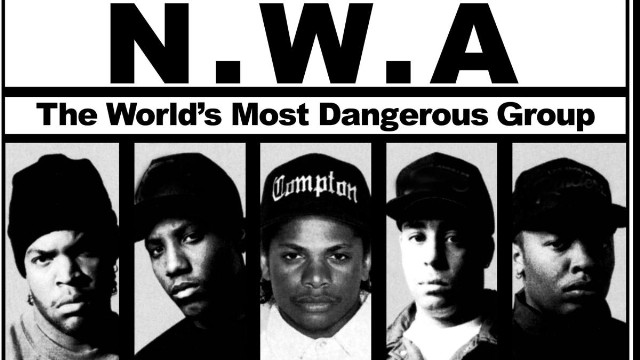Kings vs. Underdogs

Tags: USA
Kings vs. Underdogs published by Evanvinh
Writer Rating: 5.0000
Posted on 2016-03-18
Writer Description: Evanvinh
This writer has written 733 articles.
N.W.A., the group that brought gangster rap to the mainstream, angering conservatives and the F.B.I. along the way, burned hot and fast. The core group as it's remembered today -- Dr. Dre, Ice Cube, Eazy-E, MC Ren, DJ Yella -- was together for only about two years, and in total the group lasted for maybe five, from the late 1980s to early '90s.
But N.W.A. crammed several lifetimes into that short space, many -- but not all -- of which get airtime in the new biopic ''Straight Outta Compton,'' which opens on Aug. 14.
Here we see the group members as fresh-faced Compton teenagers, as buddy collaborators and, eventually, as firebrands. What you don't see much of, though, is them as successful rap stars. Apart from a handful of scenes that show how quickly N.W.A. turned into an arena-worthy live act, and some flashes of the excess -- primarily wealth and women -- that came with their triumph, the group's most robust period is largely clouded here by other concerns.
But the de-emphasis on the group's era of peak achievement is consistent with how Hollywood has long approached hip-hop. Like most of the hip-hop films before it, ''Compton'' does much better capturing the group -- and by extension, hip-hop -- as a product of struggle. Naturally, watching people overcome long odds thanks to their creative gifts has strong narrative impact. Everyone loves an underdog.
But what about a king? When it comes to capturing hip-hop success -- the period that comes after the ascent -- Hollywood has been ambivalent at best. If hip-hop was still primarily an underdog story, this would be understandable, but the genre is at the center of pop culture, both commercially and aesthetically. It's minted several generations of stars. Film is maybe the last place it's infantilized.
Excluding first-wave cash-in films like ''Beat Street'' and ''Krush Groove'' and also documentaries -- more on those later -- hip-hop films have fallen into roughly two categories. There are the biopics that purport to tell true stories, like ''Compton'' and ''Notorious,'' the 2009 retelling of the life of the Notorious B.I.G., who was killed in 1997; and the lightly fictionalized films in which actual artists' back stories are used as inspiration for original characters. Think of ''8 Mile,'' the 2002 film based on Eminem's early years, and ''Get Rich or Die Tryin','' the 2005 film modeled after 50 Cent's origin story.
All these films favor their subjects' years of initial struggle over their years in the spotlight. Take the romance associated with the written word, which runs through all of them. In ''Compton,'' a young Ice Cube obsesses over his rhyme notebook on the bus, while in ''8 Mile,'' Eminem's B. Rabbit does the same, scribbling on tattered sheets of paper at odd angles. Most of these films use lyric-writing as a means of overcoming a difficult situation -- in ''Get Rich'' it's childhood trauma, and also jail; in ''Notorious'' it's childhood teasing, and also jail.
But N.W.A. was much more than that. It was among the first rap acts to focus lyrics strictly on violent, street life fantasy, and also the loudest in its protest of overzealous policing, including its 1988 single that spawned a vulgar catchphrase that persists to this day.
But given the intensity of N.W.A.'s breakthrough, though, this narrow approach feels nave. There's a clear tension between the two sections of ''Compton'': its heroic beginning, in which five unlikely stars climb their way to fame and infamy; and its protracted, staggering conclusion, packed thick with contract squabbles, Eazy-E's decline and death from AIDS-related complications in 1995 and maudlin reconciliations. The film skips uncomfortable chapters of the group's rise -- Dr. Dre's assault on the TV host Dee Barnes, accusation of racial insensitivity and homophobia in Ice Cube's ''Black Korea'' and ''No Vaseline'' -- in favor of the ones that make its members look like achieving underdogs, such as their public quarrel with the F.B.I. (''Notorious,'' by contrast, shows the Notorious B.I.G. being violent with two of the most important women in his life, Faith Evans and Lil Kim.)
This is at least partly a reflection of who's doing the producing. You can feel the guiding hands of Ice Cube, Dr. Dre and Eazy-E's widow, Tomica Woods-Wright -- all executive producers -- each looking to boost post-N.W.A. reputations. ''Compton'' also capitulates to Hollywood's need for neat endings. Dr. Dre and Ice Cube are shown moving on to their next lucrative ventures: Dr. Dre departs Death Row in a principled fury and announces the name of his (troubled) new label, Aftermath; Ice Cube works on the script for ''Friday,'' the movie that would give him his first real foothold in Hollywood, now his home. Eazy-E's failing health and eventual death is used as a loud cautionary tale, and an opportunity for the formerly warring group members to find common ground.
But ''Compton,'' a film about a spectacularly complex group, doesn't benefit from its Hollywood ending. It also doesn't help that this era has already been satirized in two films, ''CB4'' and ''Fear of a Black Hat'' -- richly, with both venom and love. That was also two decades ago, which means that for at least that long, the tropes of the era have been absorbed into the pop culture slipstream and no longer need to be sanitized.
Still, for all its flaws, ''Compton'' is a rarity: a studio-produced hip-hop film, one with a budget of $29 million, according to The Hollywood Reporter. (That's $9 million more than ''Notorious,'' and roughly $11 to $12 million less than ''8 Mile'' or ''Get Rich or Die Tryin'.'')
In part, that's because the genre is young: Biopics typically focus on artists whose careers are complete, whether because of old age or death; plenty of hip-hop's first wave of megastars are still making music. There are also omnipresent issues around music rights. That means there are many great rap biopics yet to be made -- about Jay Z; Master P; Sean Combs; Lil Wayne and the Cash Money Records story; and Tupac Shakur (who's been given the documentary treatment).
Any of those would demand a real reckoning with hip-hop success, though. Hip-hop has been an organic healing force, sure, but it's also a product and tool of capitalism. As recently as ''8 Mile,'' in 2002, a film about hip-hop could effectively skip mentioning its commercial potential. B. Rabbit, Eminem's character, isn't a rising star navigating the treacherous waters of new fame but a battle rapper in search of respect; he doesn't even quit his day job. In ''Get Rich,'' rap stardom is a goal but not achieved. 50 Cent is one of the most commercially successful rappers of the 2000s, but the film ends with his character, Marcus, removing his bulletproof vest onstage at a concert in his old stomping grounds, still lightyears away from fame.
Unexpectedly, it's fallen to television to tackle hip-hop as an continuing, commercially successful art form. In 2003, there was the short-lived UPN series ''Platinum,'' and last year came ''Empire,'' the breakout primetime soap opera, which collapsed oodles of familiar rap narratives into one, rummaging through the genre's history at breakneck speed for inspiration. Television isn't above excavating the genre's innocent past, too. Baz Luhrmann is spearheading ''The Get Down'' for Netflix, about a crew of South Bronx teenagers at the birth of hip-hop, and VH1 recently filmed ''The Breaks,'' an original movie-cum-backdoor pilot -- inspired by ''The Big Payback,'' Dan Charnas's detail-packed hip-hop history book -- set in 1990, just at the dawn of hip-hop's commercial explosion.
And sometimes, hip-hop success manifests itself in unexpected film choices. Only a group at the height of its powers could have survived ''Tougher Than Leather,'' the bizarre 1988 Run-DMC movie notable mainly for Rick Rubin's role as a bigoted criminal who giddily uses racial epithets. The film is also, in many ways, the seed of the Rapsploitation movement of low-budget, straight-to-VHS movies, a mode refined by Master P in the late 1990s with his No Limit Films. That shingle released clunky but engaging gangster flicks -- ''I'm Bout It,'' ''MP Da Last Don'' and more -- usually paired with album releases on No Limit Records. (Eventually, No Limit released films in movie theaters, but none as amusing or raw.) Rather than make films about hip-hop, Master P used his emerging celebrity and financial clout to remake himself as a multimedia mogul, a more interesting choice than those made by most rappers who would rather be immortalized in films than make them.
By the late 2000s, digital documentation was becoming standard, so it shouldn't be a surprise that two of the most revealing and provocative hip-hop films have been recent documentaries. Michael Rapaport filmed A Tribe Called Quest on a 2008 tour, a decade after its final album, and captured a group in perennial distress. The resulting 2011 film, ''Beats, Rhymes & Life: The Travels of A Tribe Called Quest,'' is both reverent and distressingly unvarnished, taking the group's importance largely as a given and letting the members' disagreements steer the narrative.
That film captures a great hip-hop group well past its peak. Even more striking and revealing is ''The Carter,'' from 2009, directed by Adam Bhala Lough and capturing Lil Wayne at the height of his drug-addled productivity and popularity, releasing endless numbers of songs online for free and selling one million copies of his album ''Tha Carter III'' in its first week. In between recording his outrageously dexterous rhymes, Lil Wayne is a cipher; he watches ESPN, sips syrup and never sits for a formal interview. It's a little like watching Nero fiddle just before Rome begins to burn.
In an age of perpetually running cameras, the possibility of an honest, robust, glamour-and-warts hip-hop film only increases. And in a way, one already exists: ''Tupac: Resurrection,'' the impressionistic 2003 posthumous documentary narrated almost wholly in Mr. Shakur's own words, much like ''Amy,'' the recent Amy Winehouse documentary. Mr. Shakur was one of the great hip-hop provocateurs, a charismatic musician and also a savvy actor. He was tender and tough. He was constantly renegotiating his public self, drawing people in and then pushing them away.
And because of his popularity, he was forever on camera. This film was made in partnership with MTV and relied heavily on interviews, especially from the years when Mr. Shakur was beset with legal issues. A clear child of N.W.A. who also understands the art of persuasion, he speaks frankly -- about his upbringing, about his unlikely ascent, about the bad choices he made along the way, and about things that wouldn't fully reveal themselves to be bad choices until after his murder, in 1996. His candor and charm make for a film that understands hip-hop not just as a means of overcoming struggle, but also a place of easy thrills, a war zone that poses danger to its heroes, and a world without neat endings.
Gale Document Number: GALE|A424729829
Sources: http://ic.galegroup.com.db24.linccweb.org/ic/ovic/NewsDetailsPage/NewsDetailsWindow?failOverType=&query=&prodId=OVIC&windowstate=normal&contentModules=&display-query=&mode=view
You have the right to stay anonymous in your comments, share at your own discretion.


